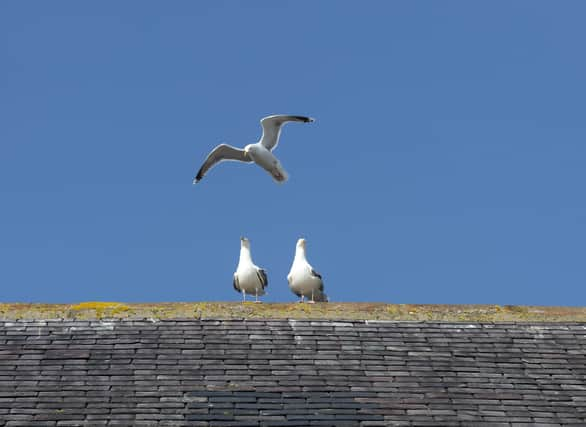Residents and visitors urged not to feed the gulls as nesting season begins in Aberdeenshire


The message comes as nesting season begins and is in response to continuing complaints relating to gulls from communities across Aberdeenshire including noise, aggressive behaviour, fouling and the feeding of gulls.
Gulls are doing particularly well in many towns and villages - both in urban and rural areas - largely because people continue to provide food for them.
Advertisement
Hide AdAdvertisement
Hide AdWhile gulls have been associated with coastal communities for generations and follow the fishing fleet in and out of our ports, the artificial food supply we are creating is helping them to thrive - which is neither healthy for the birds nor our communities.
The council’s message is to help discourage gulls from nesting in our towns and villages and to ensure they once again start feeding on appropriate natural food sources.
Last year, the council received more than 600 complaints about people feeding gulls, with warning letters issued to all those responsible.
However, the council’s Protective Services currently have no statutory powers to take action against gulls and can only give advice to members of the public as to how they can help deal with the problem.
Gulls are protected under the Wildlife and Countryside Act 1981, which means it is illegal to capture, injure or destroy any wild bird, or interfere with its nest or eggs, unless you have a licence for each individual case.
Usually, the issue with the gulls starts in March and continues until September while they are nesting on rooftops, although there are increasing numbers choosing to remain in towns all year round.
It is the sole responsibility of the owner of property to protect it against gulls nesting on it and works must be undertaken by a pest controller or other professional body.
Find more guidance on gull management at www.nature.scot/doc/guidance-gull-management.
Advertisement
Hide AdAdvertisement
Hide AdAberdeenshire Council is currently inspecting its own properties to tackle any issues impacting the estate and is encouraging other property owners do the same.
So how can you stop gulls from nesting?
Help reduce or disrupt nesting colonies of birds by using deterrents such as fitting long spikes to nesting locations such as chimney-stacks, short spikes to nesting locations such as dormer roofs or wires to prevent gulls landing.
How can you stop gulls from scavenging?
Gulls often hunt for meals in bins and take food when it is dropped on the ground.
You can help reduce the amount of food available and stop them foraging by not feeding gulls, keeping food out of sight, storing your waste securely to prevent gulls getting into bags and disposing of your litter properly.
Cllr John Crawley, chair of Aberdeenshire Council’s Infrastructure Services Committee, said: “While there is no doubt that many of our communities – particularly around coastal areas – do have serious issues with aggressive gulls, we cannot lose sight of the fact that much of the problem still lies with those feeding them or making it easy for them to source human food.
“We have very limited powers as a local authority to take action against the gulls, and as we have said for many years now, the key to reducing attacks and the mess caused by gulls lies in reducing their ability to breed and limiting the supply of food.
"I would encourage residents and visitors to Aberdeenshire to follow our simple advice – don’t feed them and dispose of all food waste and litter correctly.”
Vice-chair Cllr Isobel Davidson added: “Gulls continue to be part of our rich natural environment and we have to remember that they are not the issue here – we are.
Advertisement
Hide AdAdvertisement
Hide Ad" Through feeding and littering, we’re generating a ready-made food supply for them which is encouraging them to fly into our communities and nest close to the food source.
“Now is also the time for property owners – both residential and commercial – to follow our lead and take action to gull-proof their buildings ahead of the nesting season.”
You can download our Survivor’s Guide to living with Urban Gulls at www.aberdeenshire.gov.uk/environment/environmental-health/pests/#gulls